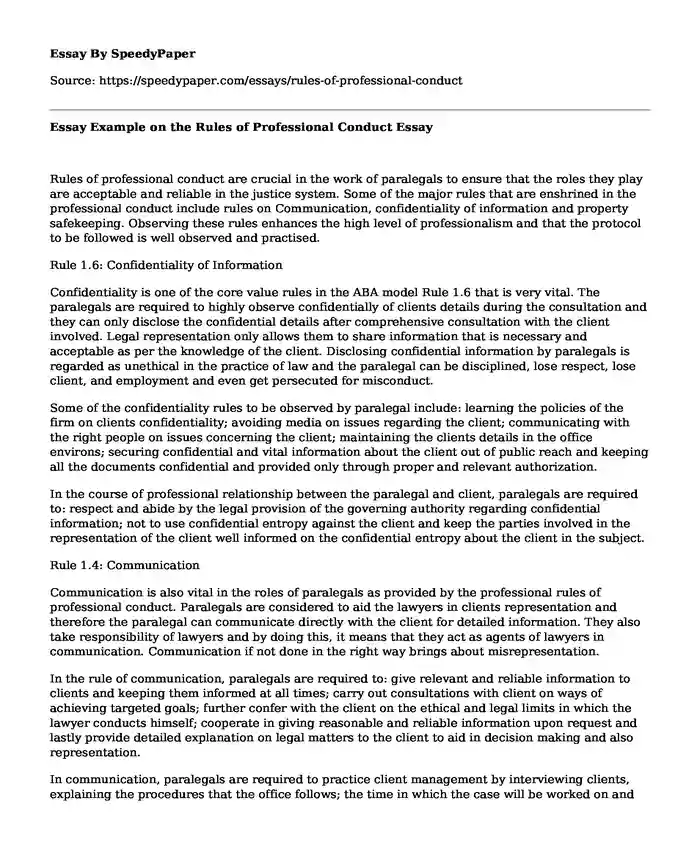
| Type of paper: | Essay |
| Categories: | Communication Ethics Profession |
| Pages: | 4 |
| Wordcount: | 831 words |
Rules of professional conduct are crucial in the work of paralegals to ensure that the roles they play are acceptable and reliable in the justice system. Some of the major rules that are enshrined in the professional conduct include rules on Communication, confidentiality of information and property safekeeping. Observing these rules enhances the high level of professionalism and that the protocol to be followed is well observed and practised.
Rule 1.6: Confidentiality of Information
Confidentiality is one of the core value rules in the ABA model Rule 1.6 that is very vital. The paralegals are required to highly observe confidentially of clients details during the consultation and they can only disclose the confidential details after comprehensive consultation with the client involved. Legal representation only allows them to share information that is necessary and acceptable as per the knowledge of the client. Disclosing confidential information by paralegals is regarded as unethical in the practice of law and the paralegal can be disciplined, lose respect, lose client, and employment and even get persecuted for misconduct.
Some of the confidentiality rules to be observed by paralegal include: learning the policies of the firm on clients confidentiality; avoiding media on issues regarding the client; communicating with the right people on issues concerning the client; maintaining the clients details in the office environs; securing confidential and vital information about the client out of public reach and keeping all the documents confidential and provided only through proper and relevant authorization.
In the course of professional relationship between the paralegal and client, paralegals are required to: respect and abide by the legal provision of the governing authority regarding confidential information; not to use confidential entropy against the client and keep the parties involved in the representation of the client well informed on the confidential entropy about the client in the subject.
Rule 1.4: Communication
Communication is also vital in the roles of paralegals as provided by the professional rules of professional conduct. Paralegals are considered to aid the lawyers in clients representation and therefore the paralegal can communicate directly with the client for detailed information. They also take responsibility of lawyers and by doing this, it means that they act as agents of lawyers in communication. Communication if not done in the right way brings about misrepresentation.
In the rule of communication, paralegals are required to: give relevant and reliable information to clients and keeping them informed at all times; carry out consultations with client on ways of achieving targeted goals; further confer with the client on the ethical and legal limits in which the lawyer conducts himself; cooperate in giving reasonable and reliable information upon request and lastly provide detailed explanation on legal matters to the client to aid in decision making and also representation.
In communication, paralegals are required to practice client management by interviewing clients, explaining the procedures that the office follows; the time in which the case will be worked on and assurance of the high level of professionalism in handling the case of the client. Since some clients are so impatient and need immediate attention, paralegals are forced to establish policies that help control the communication process with the clients.
Rule 1.15: Safekeeping Property
In the rule of safekeeping property, there are various scenarios that impact the work of paralegals. They are therefore required to: hold clients belongings with a separate representation from that of the lawyers property. Funds of the client are kept in a different account but maintained in the lawyers office with the full knowledge of the client. The relevant documentation of all the properties and funds shall be taken care of in the lawyers office for a period of five years after which the representation is terminated.
In the case of representation where a paralegal possess property belonging to more than one person, and there is a dispute, the property shall be kept separate by the lawyer and those that have no disputes are the ones to be distributed. When funds and other properties that have clients interest are received, the lawyer is required to inform the client or even the third person involved. As provided by the ruling, the lawyer can give the client or third person any property or funds that they claim and are entitled to receive. The lawyer can also deposit the trust account of a clients legal fees and also include expenses paid in advanced so as to be taken by the lawyer because expenses are incurred and fees earned.
In the management of trust accounts, a lawyer shall not be allowed to withdraw from trust accounts by use of any given debit card or ATM. Transfers shall only be made by professional law practitioners recognised by the law. The signing of trust accounts is permitted to lawyers that are legally recognised and authorized by law to carry out such roles. Paralegals shall also reconcile all the records of the trust accounts on the level of an individual client and the bank statement belonging to the trust account of the lawyer.
Cite this page
Essay Example on the Rules of Professional Conduct. (2019, Sep 03). Retrieved from https://speedypaper.net/essays/rules-of-professional-conduct
Request Removal
If you are the original author of this essay and no longer wish to have it published on the SpeedyPaper website, please click below to request its removal:
- Phenomenological Research Paper Example
- Change Management Impact Analysis - Case Stusy Examples
- Free Essay on Community-oriented Policing
- Reflecting Essay Sample on Personal Development Planning
- Ethical Intuitionism, Divine Command Theory, and Utilitarianism - Essay Example
- Free Essay Sample on Superconnected
- Free Essay. Why Supreme Court Justices Should Not Be on the Bench Forever Until Death
Popular categories




